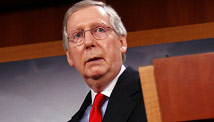Drop the 'big-government' agenda

- Republican leader in Senate urges president to change course
- Mitch McConnell says Obama should drop "big-government" plans, clamp down on spending
- He says unused TARP and stimulus funds should be used to pay down debt
- McConnell: The health bill should be shelved
Editor's note: Sen. Mitch McConnell, a Republican from Kentucky, is minority leader of the U.S. Senate.
Washington (CNN) -- When the president took office last January, he vowed to tackle the economic crisis head on. Yet over the past year, Americans have seen their economic situation deteriorate even further.
For the nearly 3.5 million Americans who lost their jobs, the nearly 3 million people who lost their homes, and many millions more, 2009 was another very painful year. This is why most Americans hope the White House will change direction in 2010 -- and that's exactly what most of them will be listening for signs of in the president's first State of the Union address Wednesday night.
Many Americans were surprised by the way the administration approached its first year in office. Americans wanted the administration and Democrat leaders in Congress to implement policies to create jobs, spur the expansion of small businesses, and help middle class families make ends meet.
What they got instead were trillion-dollar spending bills, a misguided government experiment to upend our health care system, and trillions of dollars in debt that our children and grandchildren will be saddled with for decades.
The recent elections in New Jersey, Virginia and Massachusetts were proof that Americans have run out of patience with the policies of the administration and Democrat leaders in Congress.
So it's my hope that the White House will use the State of the Union address to announce that it will put aside the big-government, big-spending agenda of the past year, move to the center, and embrace the sensible, step-by-step approach to our problems that Americans are asking for. Along these lines, here are some things the Administration could do:
• Put the 2,700-page Democrat health care plan on the shelf, and leave it there. The best first step we could take in righting our economic ship is to take this job-killing and tax-increasing monstrosity off the table once and for all and move toward the kind of step-by-step approach Americans really want.
• Prevent tax hikes: Declare that taxes will not go up at the end of the year, as they're scheduled to, for millions of American families and businesses. Even some Democrats are calling on the administration to do this. Struggling small businesses are asking themselves whether they can hire new workers; the prospect of a massive tax hike makes it far less likely they will.
• Return TARP to taxpayers: Return unused TARP money and put it toward paying down the deficit. Taxpayers who bailed out the banks last year are wondering why their money is still lying around unspent; money that's come back to the Treasury should be used to pay down the deficit, not used on new spending programs.
• Stop spending borrowed stimulus funds: The stimulus was sold to the public on the promise that it would hold unemployment at 8 percent. A year later, unemployment is at 10 percent, its highest level in a quarter century. At a time of trillion-dollar deficits, the administration should direct unspent stimulus funds to pay down our debts right now, rather than have money spent out on questionable projects nine years down the road.
• No more debt: Later this week, the administration, with an assist from Democrats in Congress, plans to increase the amount of money available on the federal credit card by nearly $2 trillion. In other words, they want to increase the amount of money we can borrow by an amount equivalent to what it cost to pay for the entire federal budget 10 years ago.
• Get out of the auto and insurance businesses: Explain to the American people how the federal government will end its ownership of auto companies, insurance companies, and banks. Americans don't think the U.S. government should be one of the largest shareholders of GM, Chrysler, and AIG.
• Expand domestic energy: Nuclear power is one of the cleanest, most efficient sources of energy. The administration should commit to expanding nuclear power as well as clean coal. And until these clean, green sites are up and running, it should allow the states to drill for oil and natural gas off their shores, if they want to.
These are just some things the White House could do to demonstrate that it has heard the concerns of the American people -- and the voters of Massachusetts, Virginia, and New Jersey -- and that it is willing to work closely and in the light of day with both parties to improve our economy and to get Americans back to work. It isn't too late to work together.
The opinions expressed in this commentary are solely those of Sen. Mitch McConnell








